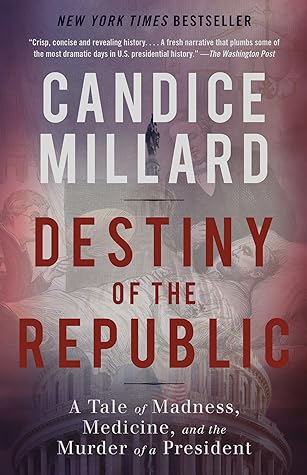More on this book
Community
Kindle Notes & Highlights
Read between
August 24 - August 31, 2024
“The children were not pleased with the way the story came out,” he admitted in his diary, but he hoped that they would come to “appreciate stories that [do not] come out well, for they are very much like a good deal of life.”
Nancy Ellis liked this
There is some of the slumbering thunder in my soul and it shall come out.”
“I am aware that I launch out upon a fickle current and am about a work as precarious as men follow,”
he felt “like throwing the whole current of my life into the work of opposing this giant evil.”
“Servitium esto damnatum.” Slavery be damned.
“I have so long and so often seen the evil effects of the presidential fever upon my associates and friends that I am determined it shall not seize me,”
Guiteau claimed to work directly for God—to be “in the employ of Jesus Christ & Co., the very ablest and strongest firm in the universe”—he
“There is a tone of sadness running through this triumph,” he wrote, “which I can hardly explain.”
Even Mark Twain, who complained that “the voice already carries entirely too far as it is,” talked his boss at the Hartford Courant into putting a telephone in the newsroom. Then, still grumbling that “if Bell had invented a muffler or a gag he would have done a real service,” he had two installed in his own home, one downstairs for his family and a second in the third-floor billiard room just for himself.
Nancy Ellis liked this
He could give fourteen-year-old Mollie a quick hug before she scurried out of the house, books tucked under her arm, on her way to Madame Burr’s School, which she walked to alone every day.
“Whatever fate may await me, I am resolved, if possible, to save my children from being injured by my presidency,” he wrote.
On March 5, Garfield’s first day at work, a line began to form before he even sat down to breakfast. By the time he finished, it snaked down the front walk, out the gate, and onto Pennsylvania Avenue.
“What is there in this place that a man should ever want to get into it?”
presidents were expected not only to be personally available to the public, but to live much like them. When President Hayes had traveled to Philadelphia five years earlier for the opening ceremony of the Centennial Exhibition, he had bought a ticket and boarded the train like everyone else.
watching as her temperature steadily climbed, he realized with a helpless desperation that he could do nothing to save her.
By this time, three presidents had died in office (Harrison, Taylor, and Lincoln), and four wives died during or before their husband's terms (Jefferson, Jackson, Van Buren, and Tyler).
“My God,” he murmured, “how many hours of sorrow I have passed in this town.”
Thanks to an extraordinary, spontaneous act of sympathy that united passengers and rail workers all along their journey, however, ten-year-old Irvin and eight-year-old Abe remained completely unaware of what had happened to their father.
Whenever they came to a pothole, policemen would carefully lift the ambulance, trying their best not to jar it.
Had Garfield been shot just fifteen years later, the bullet in his back would have been quickly found by X-ray images, and the wound treated with antiseptic surgery. He might have been back on his feet within weeks. Had he been able to receive modern medical care, he likely would have spent no more than a few nights in the hospital.
it nearly drowned him.
The glorious day has all too swift an ending; Night cometh after all
he found himself standing in his parlor, its green blinds closed to the newsmen gathered outside, with a New York state judge standing before him, swearing him into office.
Today, Arthur's brownstone is Kalustyan's, an interntional foods store and deli. His inauguration there is noted only by a small plaque inside an unassuming, locked space.


